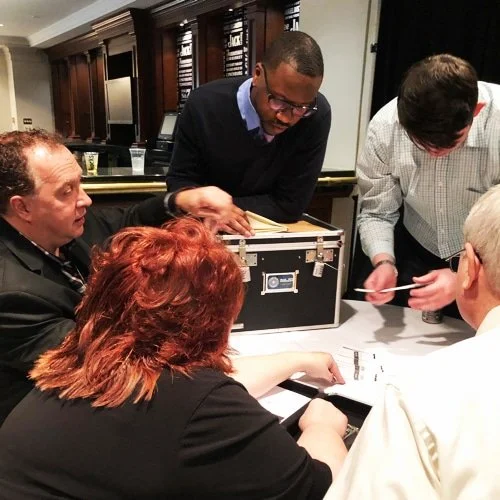
Benefits of Escape Room Games
Escape room games, which involve a group of people working together to solve puzzles and riddles in order to "escape" from a locked room within a specified time frame, offer several benefits for teams. Here are some of the advantages of participating in escape room games as a team-building activity:
Collaboration and teamwork: Escape room games require collaboration and teamwork. Team members must work together, leveraging their individual strengths and skills, to solve the puzzles and escape the room. The game promotes effective communication, coordination, and cooperation among team members. It encourages them to share ideas, delegate tasks, and work towards a common goal, fostering a sense of unity and teamwork.
Problem-solving and critical thinking: Escape room games are designed to challenge participants with complex puzzles and problems that require critical thinking and problem-solving skills. Teams must analyze the clues, think creatively, and apply logical reasoning to solve the puzzles within the given time limit. Engaging in these activities helps team members develop their problem-solving abilities and enhances their analytical thinking skills, which can be valuable in the workplace.
Time management and decision-making: Escape room games are often timed, adding an element of urgency and pressure. Teams must manage their time effectively, prioritize tasks, and make quick decisions under the time constraint. This aspect of the game helps team members develop skills in time management, decision-making, and adaptability. They learn to work efficiently within a limited time frame, which can translate to improved productivity in real-life work scenarios.
Communication and trust-building: Effective communication is crucial in escape room games. Team members must communicate their observations, findings, and ideas to ensure everyone is on the same page. Clear and concise communication is key to solving the puzzles successfully. Moreover, the game fosters trust-building among team members. They must trust and rely on each other's abilities, judgment, and information-sharing to progress through the game. This trust-building exercise can strengthen relationships within the team and improve collaboration back in the workplace.
Stress management and resilience: Escape room games often induce a level of stress and excitement due to the race against the clock. Team members must manage their stress levels, stay calm, and think clearly under pressure. This helps them develop resilience and the ability to perform effectively in high-pressure situations. The experience of successfully completing challenging tasks in a time-sensitive environment can boost team members' confidence and their belief in their ability to handle stressful situations.
Fun and engagement: Escape room games provide an enjoyable and engaging team-building experience. They offer a break from routine work and allow team members to relax and have fun together. The game's immersive nature and the excitement of unraveling mysteries create a memorable shared experience that promotes team bonding and camaraderie.
Observation and listening skills: Escape room games require keen observation and active listening. Team members must pay attention to details, clues, and hints scattered throughout the room. This enhances their observation skills and encourages active listening, ensuring that valuable information is not missed. These skills are transferable to the workplace, where attention to detail and active listening are crucial for effective teamwork and problem-solving.
In summary, escape room games as team-building exercises promote collaboration, problem-solving, communication, trust-building, and stress management. They provide an engaging and enjoyable experience while imparting valuable skills that can benefit teams in the workplace.

Benefits of Team Building
Team-building exercises offer numerous benefits for both individuals and organizations. Here are some key advantages of engaging in team-building activities:
Enhanced Communication: Team-building exercises encourage open communication among team members. Through interactive and collaborative tasks, participants develop better listening and speaking skills, which lead to improved understanding, reduced conflicts, and more effective teamwork.
Improved Collaboration: By engaging in team-building exercises, individuals learn how to work together more effectively. They discover each other's strengths, weaknesses, and preferred working styles, leading to enhanced collaboration and a more cohesive team environment.
Increased Trust: Trust is a vital component of successful teams. Team-building activities build trust by fostering relationships, increasing understanding, and providing opportunities for team members to rely on one another. Trust leads to improved morale, cooperation, and productivity.
Enhanced Problem-Solving Skills: Many team-building exercises involve solving complex problems or completing challenging tasks. These activities promote critical thinking, creativity, and the development of problem-solving skills within the team. Team members learn to approach problems from different perspectives and leverage each other's expertise to find innovative solutions.
Strengthened Team Bonding: Team-building activities create a sense of camaraderie and strengthen the bonds between team members. They provide an opportunity for individuals to connect on a personal level, share experiences, and build relationships beyond the confines of their regular work environment. Stronger team bonds result in improved collaboration and support within the team.
Increased Motivation and Engagement: Participating in team-building exercises can boost motivation and engagement levels among team members. These activities offer a break from routine work, inject fun and excitement, and provide a sense of accomplishment. When individuals feel valued and connected to their team, they are more likely to be motivated and engaged in their work.
Improved Team Dynamics: Team-building exercises help teams identify and address any underlying issues that may hinder their effectiveness. By promoting open communication and trust, these activities enable teams to resolve conflicts, address misunderstandings, and build a healthier team dynamic.
Better Productivity and Performance: A strong team that communicates well, collaborates effectively, and trusts each other tends to be more productive. Team-building exercises help optimize team performance by aligning team members' goals, improving coordination, and leveraging the collective skills and knowledge of the group.
Enhanced Employee Satisfaction and Retention: Engaging in team-building exercises demonstrates that organizations value their employees' well-being and recognize the importance of a positive team culture. When employees feel connected, supported, and engaged, they are more likely to be satisfied with their work and less likely to seek opportunities elsewhere.
Promotes Innovation and Creativity: Team-building activities often require individuals to think outside the box and explore new ideas. By encouraging collaboration, fostering diverse perspectives, and promoting a supportive environment, team-building exercises stimulate creativity and innovation within the team.
Overall, team-building exercises have the potential to strengthen team dynamics, improve communication and collaboration, enhance problem-solving skills, and boost overall team performance, leading to a more successful and cohesive organization.

Team Building Exercises
Team-building exercises are activities designed to enhance collaboration, communication, and cooperation among members of a team. These exercises offer several benefits that contribute to the overall effectiveness and productivity of a team. Here are some key advantages of team-building exercises:
Improved communication: Team-building exercises create opportunities for team members to interact in a non-work environment. This helps break down barriers and encourages open and effective communication. Through various activities, team members learn to express their ideas, actively listen to others, and resolve conflicts more constructively. Improved communication leads to better collaboration and understanding within the team.
Enhanced collaboration and synergy: Team-building exercises foster a sense of camaraderie and cooperation among team members. When individuals work together in a positive and supportive environment, they develop trust and build stronger relationships. This, in turn, improves collaboration and creates a synergy where team members can leverage each other's strengths to achieve shared goals.
Increased morale and motivation: Participating in team-building exercises can have a positive impact on team morale and motivation. These activities often involve fun and engaging challenges that help break the monotony of everyday work. As team members enjoy themselves and experience a sense of accomplishment, their overall job satisfaction and motivation increase, leading to higher levels of productivity.
Identification of strengths and weaknesses: Team-building exercises provide an opportunity for team members to showcase their individual skills and strengths. These activities help team leaders and members identify the unique talents and abilities of each team member. By understanding and leveraging these strengths, teams can allocate tasks more effectively and maximize their collective performance. Additionally, team-building exercises also reveal areas for improvement, enabling teams to address weaknesses and work towards continuous development.
Problem-solving and innovation: Many team-building exercises involve problem-solving tasks and challenges that require creative thinking and collaboration. By engaging in these activities, teams can develop their problem-solving skills and foster a culture of innovation. Team members learn to think outside the box, explore different perspectives, and come up with creative solutions to overcome obstacles. This enhances the team's ability to tackle complex issues and adapt to changing circumstances in the workplace.
Reduced conflicts and improved team dynamics: Team-building exercises encourage understanding and empathy among team members. By working together towards a common goal outside the usual work context, individuals gain a better appreciation for each other's strengths, weaknesses, and working styles. This understanding helps minimize conflicts and improves team dynamics by fostering a more supportive and inclusive environment.
Long-term team cohesion: Regular team-building exercises can have a lasting impact on team cohesion. By investing time and effort into building relationships and strengthening team bonds, teams can develop a sense of loyalty and commitment. This cohesion contributes to a positive team culture, where individuals feel valued and supported, leading to higher levels of collaboration and overall team success.
Overall, team-building exercises provide numerous benefits that enhance teamwork, communication, morale, problem-solving, and team dynamics. By investing in these activities, organizations can foster a positive work environment, improve productivity, and achieve better results.
